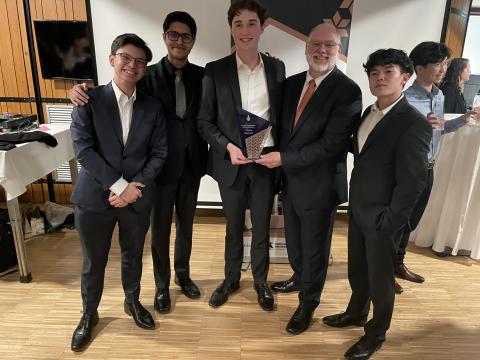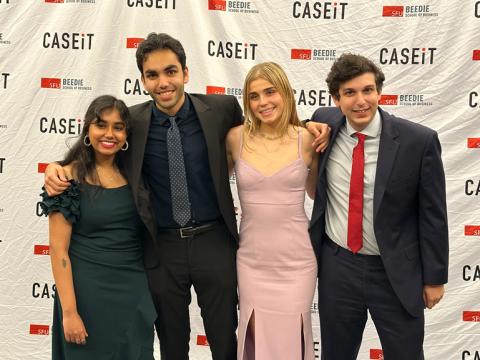
MIS Case Teams Succeed in International Competitions
Friday, May 10, 2024
The Carlson School’s Management Information Systems (MIS) case teams excelled in competitions in Budapest, Hungary, and Vancouver, Canada, during the Spring 2024 semester.
Budapest team earns 2nd place overall
In April, Carlson School students Thai Bui, Vedant Vaid, Nicholas Broske, and James Lin won their division for the 24-Hour Case and finished in second place overall at the Corvinus Undergraduate Business Experience (CUBE) competition in Budapest, Hungary.
CUBE is an intense competition featuring 16 international teams and three total cases: a pre-case sent out several weeks before the competition, a 7-hour case, and a 24-hour case.
The 7-hour case asked teams to develop a sustainable operations strategy for Hungary’s Mertcontrol Group, a leader in superintendent services for the agricultural sector. The Carlson School students recommended implementing a Learning Management System to improve the skill of the employees and a task management system to address task/job scheduling. The team earned a 3rd-place finish and committed to applying their learnings from the 7-hour case to the upcoming 24-hour case.
The 24-hour case centered around Hungary’s NN Insurance. The case challenged teams to create insurance products attractive to a younger demographic (ages 20 through 34). The Carlson School team proposed a two-pronged solution. The first was NNera, focused on affordability, flexibility, and health and wellness. The second was NN Puzzler, an online gamified quiz to understand the specific needs of the prospective customers in an effort to customize an insurance offering.
The Carlson School team earned a 1st-place finish in their division of the 24-hour case, propelling them to the final round where the team reprised their presentation to earn a 2nd-place finish. With their 2nd-place finish in the 24-hour case, coupled with their strong efforts in the pre-case and 7-hour case, the team took second place for the overall competition.
“This year marks the first time a Minnesota MIS case team advanced to the final round in Budapest,” said Ken Reily, senior lecturer of Information and Decision Sciences (IDS) at the Carlson School.
IDS Lecturer Mike Grosso served as the team’s faculty advisor in Budapest.
Vancouver team earns a pair of 3rd-place finishes
In February, Carlson School students Sakthika Vijay, Rayan Amir, Annika Olson, and Omar Hamdan finished third in their division in each of two cases at the 21st annual CaseIT MIS case competition in Vancouver.
CaseIT is the world’s longest-running MIS-focused case competition, hosted each year by Simon Fraser University. This year’s competition featured 15 teams from Asia, Europe, and North America. The competition had two rounds: the 5-hour Case I and the 24-hour Case II.
Case I centered on WELL Health, Canada’s largest owner and operator of outpatient health clinics. The case asked the students to address a major doctor shortage in Canada through the application of innovative technology such as artificial intelligence (AI). The Carlson School team proposed a combination of technical and organizational changes: using federated learning to classify patients and a team-based care model in the clinic.
Case II was a more traditional information systems case: Canada’s Pacific Coastal Airlines sought help updating its aging information systems with the goal of increasing employee satisfaction and operational efficiency. The Carlson School team presented a polished proposal that included integrating disparate systems, new business partnerships, and a new employee portal.

